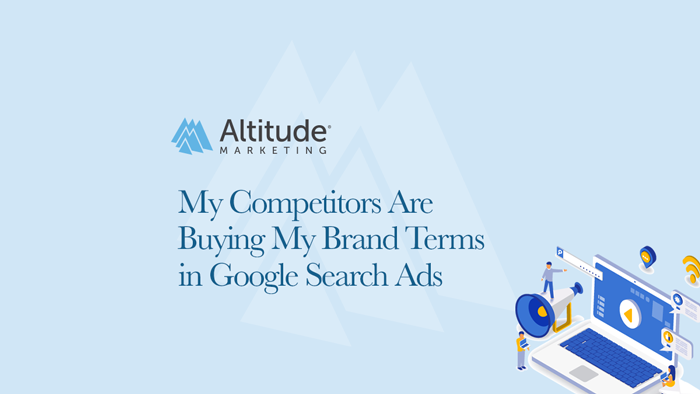It’s a tale as old as Google search ads. You look for your company name, and … there’s your competitor. First. Above you.
Sure, there’s the little “ad” disclaimer. But you’re not sure if your prospects will see that. And you know your CEO won’t – or won’t care – when he looks later.
That’s gonna be an awkward discussion.
Long story short: There’s no magic bullet when your competitors buy your brand name on Google Ads. Fortunately, there are some remedies.
All of them revolve around one key point about Google search. It’s meant to connect users with content that’s relevant to their intent. That, as you’ll see in a second, matters a lot when those jerks put ads on your brand terms.
With that in mind, here are four things to know about competitors buying your name in Google search ads:

1. It’s not illegal
We get asked this a lot. “Isn’t it trademark misuse to put ads on searches for my business name?”
Sorry, no. For better or worse, buying your competitors’ names in Google search ads isn’t illegal. Now, Google explicitly won’t let them use your trademarks in headlines or ad copy. But buying your name is fair play.
(It’s kinda dumb, but they can do it.)
Here’s the theory behind it:
Your company, TreeNet, makes office paper. Someone wants to buy office paper. They think of you, and Google your name.
With me so far? Great.
Your competitor, PaperCo, also sells paper. (Hence the name.) Google’s cool with them buying your trademark, because a search for you is really a search for “I want to buy paper.”
There’s an intent match. (Kind of.)
Now, PaperCo can’t call you out in their ad copy. “TreeNet paper sucks – try PaperCo” isn’t kosher. But “TreeNet paper is a better choice” is fine.
2. You can report abuses
If a competitor is mentioning you by name in their ad, you can report it as a Google advertising guidelines violation.
Don’t bother doing this if all they’re doing is buying your name. Again, that’s fine. But if they’re mentioning you by name, give it a go.
(Don’t expect quick results. Google Ad Specialists are busy.)
3. It’s not always malevolent
Here’s a real-world example.
A client of ours is in the utility billing space. (If you’re a property manager, try Synergy. They rock.) A company that makes billing software did a broad ad buy on the term “billing.” As a result, they were showing for searches on “Synergy Utility Billing.”
Problem? Normally, no. It’s a clearly different space. But a ton of tenants access Synergy’s site every month to pay their utility bills. That made it an issue.
Did we freak out? Report them? Frantically call Google while screaming to the heavens?
Nah.
We emailed their marketing manager. “Hey, looks like there’s an issue with your configuration. We don’t want you wasting your money on worthless clicks – and our visitors don’t want software.”
A day later, we got a “thank you” and that was that.
It’s not always that easy. Your competitors likely won’t be so nice if they’re already buying your brand terms in Google Ads. But it never hurts to reach out.
If that doesn’t work …
#4 You can fire back
This is the nuclear option, and here’s why. Remember our example about office paper? Well, a search for TreeNet is a search for office paper … but it’s really a search for TreeNet.
In other words, the intent of the search is to find TreeNet paper, not any paper.
So, sure, PaperCo can buy the term. But they’re delivering a result that is, on some level, divergent from search intent.
Why does this matter?
Google Ads are ultimately reliant on “Quality Score.” That’s a combined measure of the relevance of the ad to the search and the user’s experience.
A highly relevant ad and a great landing page yield a high Quality Score. Worse relevance or a worst landing page yield a lower Quality Score.
The lower the Quality Score, the higher your bid needs to be to show. Google will let you promote crap content, but it’ll cost you.
In other words, you will always pay less to advertise on your brand terms than your competitors will. Conversely, their brand terms will always cost you more than them.
Think of it like mutually assured destruction, search ads edition. If they buy you, you can buy them. But you’ll also need to buy yourself … and they’ll need to do the same. Everyone ends up paying for what would have been organic traffic.
Remember the part about it being kinda dumb? Yeah … that.
So, what’s the recommendation?
At the end of the day, you have recourse if your competitors start buying your brand terms on Google Ads. Try talking to them, especially if it’s obviously a mistake. If that doesn’t work – and they’re breaking the rules – report them.
Finally, you can hit their brand terms with ads. You’ll both spend a few bucks, but with luck you’ll be able to call a truce soon.



